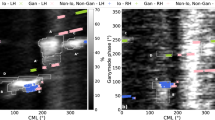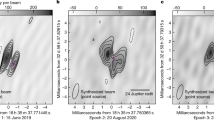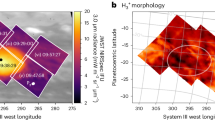Abstract
IT has recently been proposed that the very-low-frequency radiations from the Earth's exosphere and the decametric wave-length radiations from Jupiter both result from cyclotron emission by bunches of electrons travelling through their respective exospheres1,2. There are sufficient experimental results available to support strongly this hypothesis of the very-low-frequency radiation and hence by implication the validity of the cyclotron process in an exospheric situation.
This is a preview of subscription content, access via your institution
Access options
Subscribe to this journal
Receive 51 print issues and online access
$199.00 per year
only $3.90 per issue
Buy this article
- Purchase on SpringerLink
- Instant access to full article PDF
Prices may be subject to local taxes which are calculated during checkout
Similar content being viewed by others
References
Dowden, R. L., J. Geophys. Res., 67, 1745 (1962).
Ellis, G. R. A., Austral. J. Phys., 15 (in the press).
Smith, A. G., and Carr, T. D., Astrophys. J., 130, 641 (1959).
Carr, T. D., Smith, A. G., Bolhagen, H., Six, N. F., and Chatterton, N. E., Astrophys. J., 134, 105 (1961).
Ellis, G. R. A., Nature, 194, 667 (1962).
Author information
Authors and Affiliations
Rights and permissions
About this article
Cite this article
ELLIS, G., MCCULLOCH, P. Decametric Radio Emissions of Jupiter. Nature 198, 275 (1963). https://doi.org/10.1038/198275a0
Issue date:
DOI: https://doi.org/10.1038/198275a0



